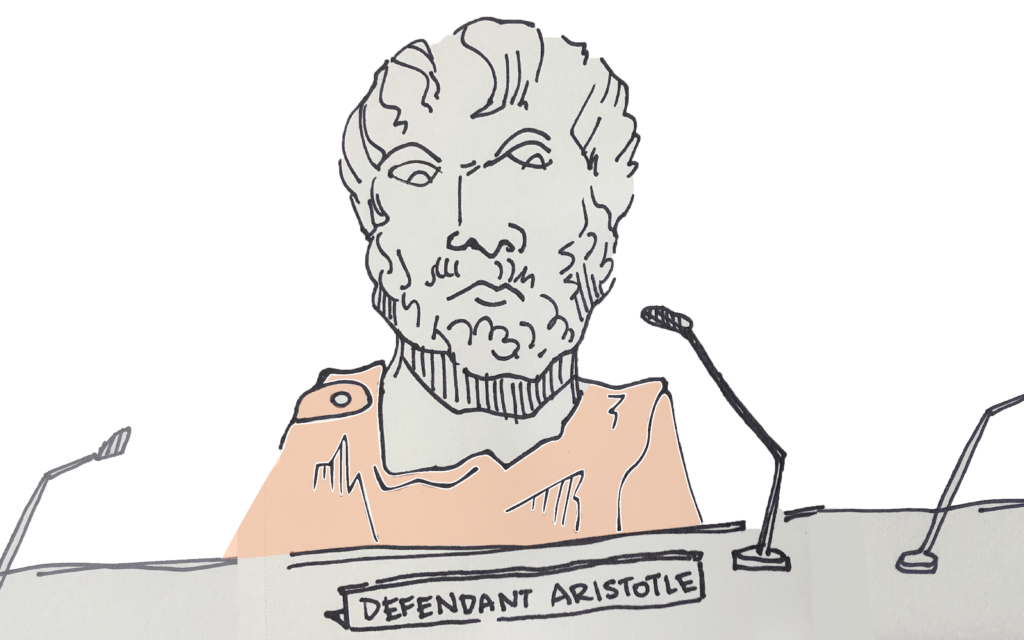Not long ago the New York Times ran an op-ed by the philosopher Agnes Callard. On the Times website its headline was a question: “Should We Cancel Aristotle?” A subhead began to answer: “He defended slavery and opposed the notion of human equality. But he is not our enemy.” Later the op-ed appeared in the Times’s print edition — the same op-ed but with a different headline: “Aristotle Is a Jerk, but We Shouldn’t Cancel Him.” (There was no subhead.) Callard, who had not been consulted, was “pretty upset.” “I wish @nytimes hadn’t changed the headline to this,” she said in tweets. “I do not believe calling people jerks is great for public discourse. Nor do I believe that Aristotle was a jerk. In fact, the piece argued for the possibility of refraining from judging Aristotle in this way.” The Times had a right to change the headline, she allowed, “but I also have a right to complain about it.”
As an editor, I’ve cooked up no end of heads and subheads in situations where I needed no permission even if I might later want forgiveness. Headlines must entice readers, and there’s seldom time for consultation about how. But I’ve also tried to follow a rule: headlines must never misrepresent what they introduce. This is one of many rules that nourish trustworthy communication, which requires continually making and keeping promises in both substance and form.
Callard was right to complain. The original headline and subhead had echoed the words it introduced, such as “we have no reason at all to cancel Aristotle. Aristotle is simply not our enemy.” But the print headline misrepresented Callard’s thought and tone by turning ugly facts she had provided into a judgment she does not share. The headline also had a useful doubleness. It protected its source by implying that the Times itself would never fail to condemn a defender of slavery. But thanks to the informal “jerk,” it also reassured readers that the Times could be counted on to avoid an unpleasant seriousness.
I’d call that print headline an instance of “messaging,” Callard’s term, repurposed from marketing jargon, for an addictive practice she argues against. Messaging “exists to perform some extra-communicative task,” she says, and in it “some aim other than truth-seeking is always at play.” In a “highly charged political climate” like today’s, “one can hardly say anything without arousing suspicion that one is making a move in the game, one that might call for a countermove. For example, the words ‘Black lives matter’ and ‘All lives matter’ have been implicated in our political power struggle in such a way as to prevent anyone familiar with that struggle from using, or hearing, them literally,” even though they could be unexceptionable in other contexts.
To “messaging speech“ Callard opposes “literal speech.” While “messaging exerts some kind of nonrational pressure on its recipient,” literal speech as Callard describes it “employs systematically truth-directed methods of persuasion.” If the second-guessing of motives could recede enough, speech made and heard literally could open an approach to truth, perhaps even reconciliation.
As for Aristotle, Callard’s chief example, why shouldn’t we “cancel” him by dropping him from our philosophy courses? Because, she says, “he can help us identify the grounds of our own egalitarian commitments; and his ethical system may capture truths — for instance, about the importance of aiming for extraordinary excellence — that we have yet to incorporate into our own.” How can we gain these “benefits of engaging with him”? By not treating him as a “hostile combatant.” If his views “directly contradict our moral sensibilities, how can we avoid hostility?” We must “take him literally — which is to say, read his words purely as vehicles for the contents of his beliefs.”
Callard concedes that Aristotle’s example is helpfully distant in the past. The possibility of a “friendly disagreement” with him offers no “direct guidance on how to improve our much more difficult disagreements with our contemporaries.” But Callard does believe that considering Aristotle “reveals something about what the target of such improvements would be.” It would be “the freedom to speak literally.”
•
“Should We Cancel Aristotle?” can speak admirably for itself, so please read it in full. I’ve begun with it here because I want to add some ideas I think it implies. Almost inevitably, contributions come from Donald Trump, who has been doing his best to beat down the door. He makes me remember another “literally,” from the 2016 campaign, that helped the reporter Salena Zito (a Trump fan) capture a disturbing reality. Trump had asserted that “58 percent of black youth cannot get a job” — a misrepresentation of the kind that “drives fact-checkers to distraction,” as Zito put it. “When he makes claims like this,” she wrote, “the press takes him literally, but not seriously; his supporters take him seriously, but not literally.”

In this case, the press, if it chose to take Trump literally, could test his “58 percent” against numbers from the Bureau of Labor Statistics and see that he was making things up. But Trump’s audiences could feel no need to test his words because he was sending a message they wanted to hear. His “alternative facts” supported an already-forming view, largely based on other untested words, that made them yearn to take him seriously. These patterns have been repeated again and again. Repetition has joined with confirmation bias to deepen the grooves.
For Callard, “truth-directed methods of persuasion” require not only tested facts in clear accounts like those of responsible journalists, scholars, and scientists, but also sound arguments based on those facts. “Being literal” goes well beyond any dictionary definition of “literal” to include an obligation to move coherently toward truth — that is, truth informed by facts and arguments (vs. imitations of them). What does “taking literally” require? Perceiving and considering the actual words at hand and honoring the same obligation to move toward truth. But in Zito’s different world, these obligations are not serious, whatever fact-checkers may believe. Messages offer a higher truth. They speak to something deep in the self, acutely sensitive but impregnable when the self commands.
•
Callard chooses to keep Trump out of her argument, perhaps because his maddening presence would unfairly reinforce it, and perhaps also because he could so easily upstage other performers with important roles. But he’s here now to represent the nature and scale of the destructive force she argues against. Not only does this force thrive in the other-excluding (even other-creating) rhetorics of in-groups, it also denies any possibilities outside those rhetorics — any principles of communication or argument that might permit escape or resolution. To gain back some of the occupied territory, and thus to improve our ways of disagreeing, we must be both more literal and more serious.
Trustworthiness is necessary. When we try to speak literally, we must also deserve to be taken literally. And skill is necessary too, especially when complex facts, thoughts, and feelings must reach across barriers to many people of many kinds. I learned this at an urban public university where I’ve both managed communications with multiple audiences and taught students from similarly multiple backgrounds. The language I aim for has to be as intelligible as possible to anyone who might encounter it. To earn trust, it also has to be continuous with the past and the future, as well as consistent with itself. It can’t take differing forms at the same time, each adjusted for its own target. Nor can it get away with building conflicting messages into individual utterances, as Trump does in his multidirectional word salads. Because it must succeed as honest public language, it tries instead to be literal and serious. From this experience I want to offer — I don’t know what to call it. A wish? A recommendation? A demand? A prayer?
Let’s struggle consciously to improve our public language. To do so, we’ll have to sharpen both skills and feelings of obligation. We may also have to go against the grain. The prevailing, linguistics-based approach rightly sees language as varied, complex, and ever-changing, but it has a hands-off, libertarian streak and a tendency to declare that whatever is, is right. The story of “literally” itself illustrates this. “Literally” means “exactly” or “word for word” and implies a constraint by reality; but it can also remove that constraint, as in “my head literally exploded.” People have fought for decades over those two senses, so it would be much more pleasant if everyone could relax. The linguist Anne Curzan agrees. “I am here to assure you,” she says, “that the fact that people are using ‘literally’ to mean both literally and figuratively does not mean that anyone is literally or figuratively killing the English language.”

It’s pleasant both to receive and to deliver such messages, but there’s a catch. “Relax” can’t be the last word, especially in the Age of Trump. It still matters whether someone is speaking literally or figuratively, not to mention falsely, and whether hearers can identify the differences. Trump is a master of inflation, not least through false metaphors like “Obama is the founder of ISIS.” But we have no public terminology for judging such statements — no widely understood way to place them on the scale that runs from the literally true through the metaphorically true to the dangerously misleading to the outright lie.
Another eminent linguist, John McWhorter, similarly tells us to relax when we hear demands to “defund the police.” Sometimes, he points out, the prefix “de-” suggests a complete subtraction, as in “dethrone,” while at others it suggests gradations, as in “deescalate.” Thus “defund” can mean either “subtract all the funds” or “subtract some of the funds.” Is it the same as “abolish the police” or is it quite different? Such tensions are common in language, as McWhorter says, but what should follow from that? His headline, which does not misrepresent his article, is “It’s Perfectly Fine to Call It ‘Defunding’ the Police.”
McWhorter comes close to justifying “defund the police” as a slogan required by context, but in Agnes Callard’s terms it’s a message, not literal speech, and if a group tries to take it literally it will split the group. McWhorter’s “perfectly fine” must not be the last word. In adequate public discourse, ambiguities like the one in “defund” are seen and hashed out — hashed out, not just pointed out. Somehow we’ll have to make it routine for people everywhere to ask others, and themselves, “when you say A, what do you mean”? And then, probably, “what do you mean by B? and C?” and so on as necessary. Pursuing such questions is a demanding art, and for clarifying some expressions, like “constitutional,” getting to Z won’t be nearly enough. But moving toward truth must still become a point of honor. Refusing to move toward truth, as in the implication-hating pro-Brexit slogan “leave means leave,” must be felt as an injury.
To become more frequent, this internalizing of duties must be nourished everywhere, especially in schools. Teaching it better will be very hard, as I can testify, because of the deep and frustrating relationships between instruction and shame. I winced when the lexicographer Kory Stamper recommended the word “regardless” for formal contexts because “if you use ‘irregardless,’ people will think you’re uneducated,” as if education leads only to snobbery. Curzan is right when she urges teachers to help students master standard language without denigrating nonstandard varieties. But in communications of any variety, there can be real sins against clarity. We have to explain those sins without making anyone feel like a sinner — it’s the only way.
And since the meanings of words are so much at issue, I’d also vote for a re-re-thinking of “the dictionary.” Once it was almost the word of God, but with good reason it no longer wants to speak from a mountaintop. Taking the currently typical stance, Merriam-Webster produces “a descriptive dictionary” that “aims to describe and indicate how words are actually used by English speakers and writers” and not to “set forth rules of ‘correctness.’” Nonetheless, lexicographers behind the scenes (Stamper was one of them) have all along taken most of their cues from rule-following publications. And dictionaries have all along served customers who value the dictionary’s power to establish common ground.
Now the Age of Trump is putting descriptivism to the test. For example, “populist,” still defined by Merriam-Webster as “a believer in the rights, wisdom, or virtues of the common people,” has throughout journalism quietly come to mean “a believer in the rights, wisdom, or virtues of some common people but not others.” “Populist” has this new sense while undeservedly keeping much of the feeling of the old — as devolving words tend to. Somehow, I can’t say how, dictionaries must record such changes while also, more deliberately and openly, serving a purpose they’ve always been needed for. They must make normative language widely inclusive, but they must also give each part of it stability and continuity. Trump’s fans by the millions have used the word “honest” to mean something like “revealing the psyche through thrilling assertions made without concern for accuracy.” What can dictionaries do to help us remember that the word “honest” is not suitable for a liar?
I’d better stop. Agnes Callard is a serious person who deserves to be taken literally, and a literal-minded person who deserves to be taken seriously. We urgently need to practice her kinds of literalness and seriousness. As we try to do this, let’s also remember the late John Lewis and try to let the spirit of peace be our guide. •




